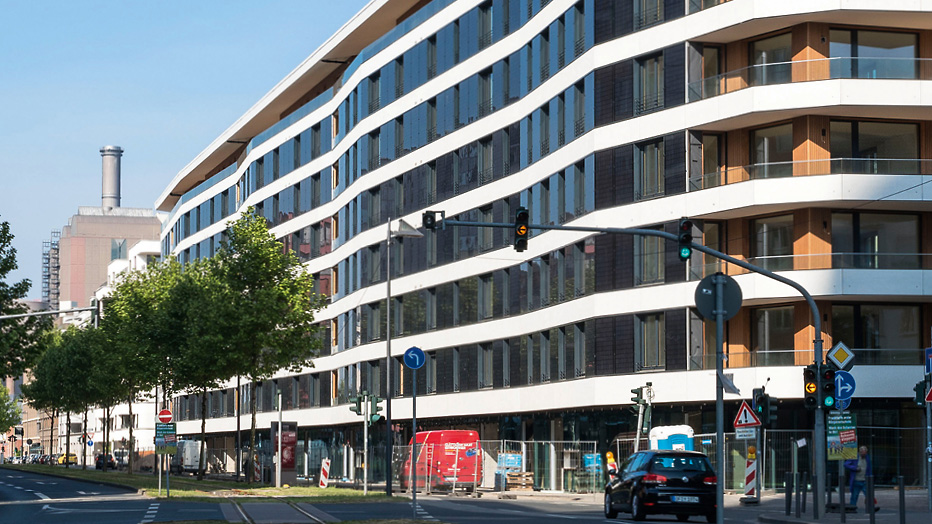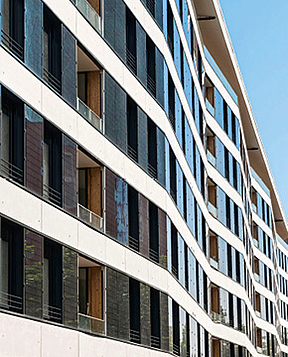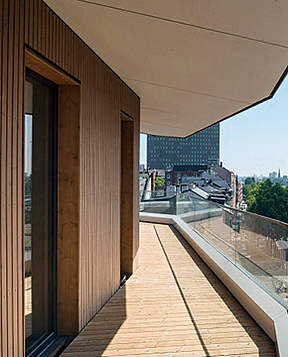Project Profile
Project Title: „Aktiv-Stadthaus Speicherstraße“
Subject Cluster: Planning and Construction
Project Objectives: Energy-Plus house with 74 housing units, energy generation (photovoltaic, waste water) covers annual household electricity, heating and hot water needs. Residents receive green electricity in a model project of the Mainova AG.
GPS Coordinates: 50.101190, 8.661429
Opening: 8th July 2015
Developer: ABG FRANKFURT HOLDING, Frankfurt am Main
Architects: HHS Planer + Architekten, Kassel
Ancillary Research: Technical University Darmstadt Department of Design and Energy-efficient Construction, Steinbeis Transferzentrum, Stuttgart
Central Control Technology: EGS-Plan GmbH, Stuttgart
Structural Design: B+G Ingenieure Bollinger und ¬Grohmann GmbH, Frankfurt am Main
Research Funding: Federal Ministry for the Environment, Nature Conservation, Building and Nuclear Safety (BMUB), Research Initiative »ZukunftBAU«
Additional funding: GRÜNER STROM project sponsored by Mainova Green Power customers
Housing accounts for 40 percent of Germany’s total energy consumption. Energy-efficient buildings or buildings which themselves generate environmentally-friendly energy for the residents - for heating, showering, household, lift and car journeys - are of particular importance for climate protection.
Highly-efficient photovoltaic modules on the roof and the façade: in Speicherstraße near Frankfurt’s Westhafen there is a residential building which produces more environmentally-friendly energy than the tenants can consume in the year. The Aktiv-Stadthaus goes beyond the passive house standard of energy-efficient construction in which Frankfurt already occupies a leading position.
The municipal housing agency ABG FRANKFURT HOLDING, which has already constructed over 2,500 residential units on passive-house principles, has developed an energy-plus building unprecedented on this scale. The apartment building has about 6,500 m², room for 74 apartments and generates enough energy to meet the tenants’ annual needs for electricity, heating and hot water.
Generating electricity on the façade
Besides the excellent thermal insulation and controlled ventilation already known from passive houses, the Aktiv-Stadthaus also has an electricity-generating building shell. About 1,000 highly efficient modules are installed on the roof, with another 330 on the façade.
Domestic heating and hot water are provided by a heat pump which recovers heat from the constantly flowing waste water in the sewers. The pump is powered by electricity from the building’s solar cells, with a battery acting as a power store, so electricity produced during the day can be used in the night.
Should the system produce too little electricity, the tenants draw green power from the public grid and when consumption is low, the system feeds electricity into the grid.
From an architectural point of view, the Aktiv-Stadthaus is an exceptional solution. Due to the demands of infill it was built on a property only 150 by 9 meters which had previously been used as a parking space and was deemed unsuitable for building. The façade is gently curving, which not only structures it optically but also increases the area available for solar panels. The pent roof is aligned in size and inclination to yield maximum solar energy.
Helping tenants to harmonise energy consumption and generation
All the apartments have built-in kitchens with energy-saving devices and economical washing machines and dryers. One special feature is a touchpanel on which tenants can read the electrical yield of the solar panels and their own energy consumption. Tenants can adjust their consumption to the power produced and, for example, switch on devices when a lot of electricity is being produced. The display also helps the tenants stay within their electricity budget. Heating and, depending on apartment size, between 1,800 and 2,500 kWh of electricity a year are already included in the rent. Any further consumption is calculated according to the Mainova AG’s tariff for tenants. This is lower than the cheapest green electricity tariff, since there are no costs for public grid cabling as the electricity is produced locally.
Connecting living and mobility
The electricity-generating building offers new scope for living and mobility. On the ground floor there are parking spaces and charging stations for electric vehicles and pedelecs which are mostly charged by the in-house batteries. Tenants can reserve the electric vehicles over the car-sharing provider book-n-drive, in which the ABG and Mainova are involved. Conventional vehicles are also available for longer trips.
Storing energy and relieving the grid
With the „Masterplan 100 % Climate Protection“, Frankfurt has pledged to cover its entire energy demand with renewable energy sources by 2050. One challenge is to reconcile the gap between fluctuating electricity production from wind and solar power plants with the needs of the consumer. This can be within a city or the region or at federal and EU level. In the Aktiv-Stadthaus, an in-house storage battery already bridges this gap while decentralised generation and individual consumption relieve the grid. The investment required for power lines sinks, which in turn reduces the costs of the energy turnaround.

Climate protection
Energy-efficient building with excellent thermal insulation, controlled ventilation and energy-generating building shell; produces more environmentally-friendly energy than the tenants consume during the year.

Electricity for the tenants
Electricity is already included in the rent; any further use is calculated according to the residents’ tariff; a touchpanel helps adjust consumption patterns to the actual electricity yield.

Energy turnaround
In-house battery bridges the gap between fluctuating electricity supply and consumption; decentralised generation and individual consumption in the building relieve the grid and lower costs.
Environment Department
Galvanistrasse 28
60486 Frankfurt am Main
Tel +49 (0)69 212 39100 – Environment hotline
umwelttelefon(at)stadt-frankfurt.de



